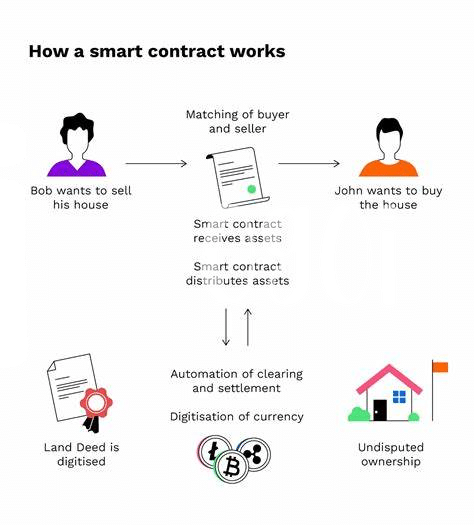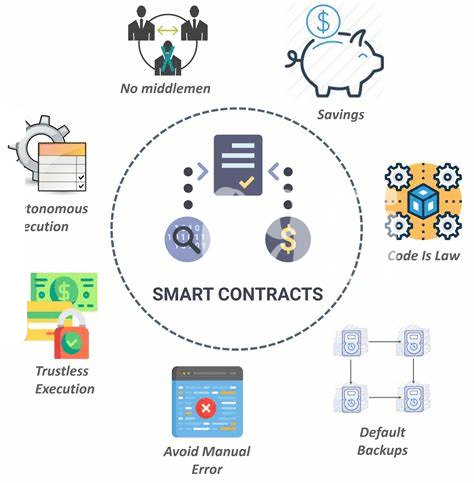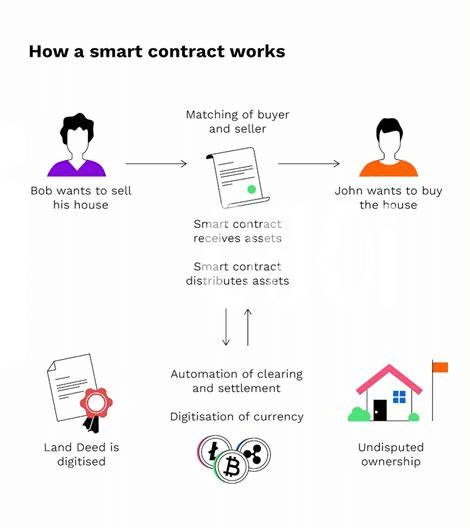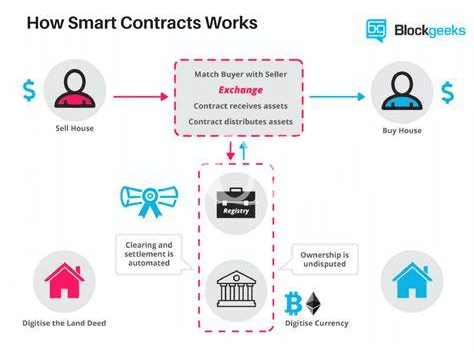What Are Smart Contracts? 📄

Imagine a world where agreements work like magic, automatically doing what they’re supposed to do without anyone having to check up on them. That’s what smart contracts are all about. They’re like regular contracts, but instead of being written on paper and requiring people or courts to make sure they’re followed, they run on computers. Specifically, these contracts are bits of code stored on a blockchain, a kind of digital ledger that’s very secure and hard to change.
Smart contracts make transactions and agreements work smoothly and trustworthily, without the need for a middleman. Think of them as self-operating digital agreements that execute and enforce themselves. For example, if you’re renting an apartment, a smart contract can automatically transfer the rental payment from your account to the landlord’s, once it verifies you’ve received the keys. This reduces the chance of fraud or disputes, as the contract only goes through if all conditions are met.
| Term | Description |
|---|---|
| Smart Contract | A digital contract that automatically executes and enforces the terms of the agreement between parties. |
| Blockchain | A digital ledger where transactions are recorded in a secure and immutable way. |
By using blockchain technology, smart contracts bring a level of security and reliability that traditional contracts can’t match, making them a groundbreaking tool in the digital age.
The Magic of Bitcoin for Smart Contracts 💫
Imagine a world where agreements are not just words on paper but are living, breathing promises that work automatically. That’s where the charm of using Bitcoin for smart contracts comes into play. Unlike traditional contracts, smart contracts on Bitcoin’s network carry out their terms autonomously, removing the need for middlemen and reducing the chance of disputes. It’s like having a robotic mediator that never sleeps, ensuring promises are kept without bias. This technology opens doors to endless possibilities, creating a more trustworthy and efficient way of doing business. Think about it: a world where transactions, from buying a house to paying for your morning coffee, are seamless, secure, and immediate. That’s the magic Bitcoin brings to smart contracts, promising a future of transactions that are as easy as sending a text message. For those interested in the intersection of technology and finance, you might find fascinating insights on sustainable practices in the industry at https://wikicrypto.news/wind-energys-potential-to-revolutionize-bitcoin-mining-sustainability.
Big Opportunities with Smart Contracts in Bitcoin 🌟

Imagine a world where agreements can be automatically executed, without the need for a middleman. That’s the promise smart contracts on the Bitcoin network offer. They’re like magic agreements sealed with a digital handshake, ensuring everyone sticks to their word. The beauty is, they run on Bitcoin’s secure and transparent ledger, making them incredibly reliable. Imagine renting a holiday home and the moment your payment is confirmed, the digital keys are yours – no waiting, no fuss.
This opens up a galaxy of possibilities 🌌. From making international business deals without the headache of currency exchange to creating trustless, automated insurance policies that pay out instantly when conditions are met, the opportunities are vast. It’s not just about making transactions faster or cheaper, but about creating new ways of doing business, sharing value, and connecting the world 🌍. The potential for innovation is limited only by our imagination, as these smart contracts on Bitcoin lay the groundwork for a future where digital trust is a given.
Tough Challenges Ahead for Bitcoin Smart Contracts 🚧

Creating a world where Bitcoin powers smart contracts sounds like knocking on the door of the future. However, this path is strewn with rocky obstacles. One of the main hurdles is the complexity around making these contracts truly “smart.” Unlike traditional contracts, which rely on clear terms and conditions laid out by humans, smart contracts depend on code. This means we need airtight programming to avoid any bugs or loopholes that could lead to disputes or, worse, financial losses. Another thorny challenge is scalability. As more smart contracts come into play, the sheer volume of transactions could overwhelm the current capacity of the Bitcoin network, leading to slower processing times and higher fees.
On top of these technical challenges, there’s the looming shadow of regulation. Governments around the world are trying to figure out how to deal with cryptocurrencies and their applications. Changes in regulation could have a significant impact on how smart contracts are used and developed. For those curious about the bridge between government oversight and digital currencies, navigating bitcoin taxation: a global perspective explained provides a deep dive into this intricate relationship. As we navigate these hurdles, the journey toward integrating smart contracts with Bitcoin promises to be both exciting and complex, demanding ingenuity and persistence from its pioneers.
Real-world Examples of Smart Contracts in Action 🔍
Imagine a world where buying a house is as simple as clicking a button, no mountains of paperwork or weeks of waiting needed. Smart contracts on Bitcoin make this dream closer to reality. Take, for example, a couple who found their dream home. Instead of going through the exhausting process of banks and lawyers, they simply use a smart contract encoded on the Bitcoin blockchain. This contract automatically checks if they have the money and then transfers ownership of the house. All of it happens securely and without the hassle, thanks to the magic of technology.
Another story comes from the world of music. An independent artist decides to sell his album directly to his fans using a smart contract. Each song is a digital key, unlocked only by a payment that goes straight into the artist’s digital wallet. This way, he enjoys full revenue without a middleman, and fans get their music instantly. These examples show how smart contracts are turning complicated, time-consuming processes into smooth, effortless transactions.
Here is a concise table highlighting these real-world applications:
| Application | Description |
|---|---|
| Real Estate Transactions | Automating the buying and selling of houses, reducing paperwork, and speeding up the process. |
| Music Industry Sales | Allowing artists to sell their works directly to fans, maximizing profits and ensuring instant delivery. |
The Future of Smart Contracts with Bitcoin 🔮

Peeking into the crystal ball to gauge what the future holds for smart contracts on Bitcoin’s platform is like stepping into a world of infinite possibilities, twinkling with the promise of revolutionizing how we interact with the digital world. The whispers among tech circles suggest a future where smart contracts become not just common but essential, streamlining financial transactions and legal agreements with a level of transparency and efficiency previously unimagined. Imagine buying a house or a car with a transaction as simple and secure as sending an email. However, the road ahead isn’t without its bumps. Issues like scalability, security, and user-friendliness need innovative solutions. But with the bright minds in the Bitcoin community tirelessly working towards ironing out these kinks, there’s a strong belief that these hurdles will be overcome. As we move forward, it’s also crucial to consider the environmental impact of such technological advancements. Adopting sustainable bitcoin mining practices for the future market trends will be key in ensuring that the expansion of smart contracts on Bitcoin’s network aligns with our broader goals of sustainability and responsible innovation. The future seems bright, with smart contracts paving the way for a more secure, efficient, and equitable digital world.✨🚀🌍
